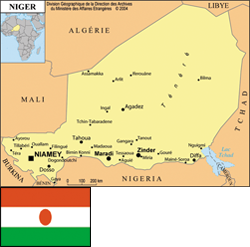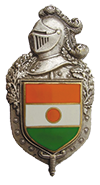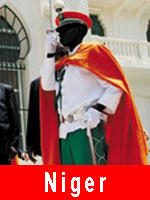
Natonal Gendarmerie of the Republic of Niger
|
1960 Ministry of attachment: Ministère de la Défense Workforce: 7 022 General manager: Général de brigade Mounkaila Issa Address: BP 230 NIAMEY – NIGER Tél.: [227] 20 72 29 89 Orders and Logistics Service: Chef d’escadron Omar Ali Tél.: [227] 20 72 31 69 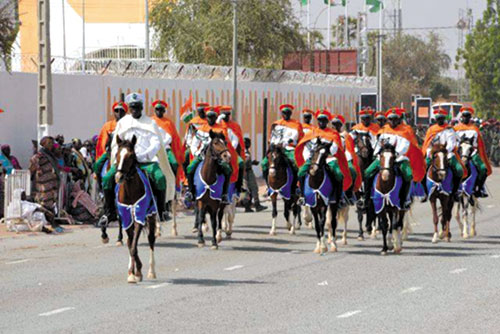
|
History
Before the independence, the development of the French Gendarmerie in Niger, French West Africa (FOA) colony, really begins after 1945. The detachment is transformed into Section by the decree n° 49-1365 of August 23rd, 1949, then in Group by the interministerial decision of November 27th, 1957, the Niger Gendarmerie Group. Besides, the gendarmes supervise the trainings of circle Guards, then the Niger territorial Guard created by the local order n° 1074/BM-ICGT of May 14th, 1956.
The law of n° 60-24 of August 1st, 1960 creates the Niger National Gendarmerie. Its organization and the regulations of the special service are fixed by the decree n° 68-86/PRN/MD of June 21st, 1968. At the beginning of 1990s, the decree n° 92-34 of 24/01/1992 organizing of the Ministry of Defence positions the National Gendarmerie High Command at the same level as the Joint Staff Chief within the Ministry of Defence. The decree n° 2006/123 of April 5th, 2006 redefines the composition, the organization and the command of the corps. The slogan is : "Professionalism - Integrity - Loyalty".
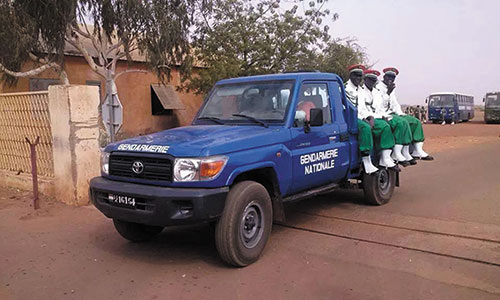
Organization
The Republic of Niger "Gendarmerie Nationale" is depends on the Ministry of Defence and is available for the Ministry of the Interior.
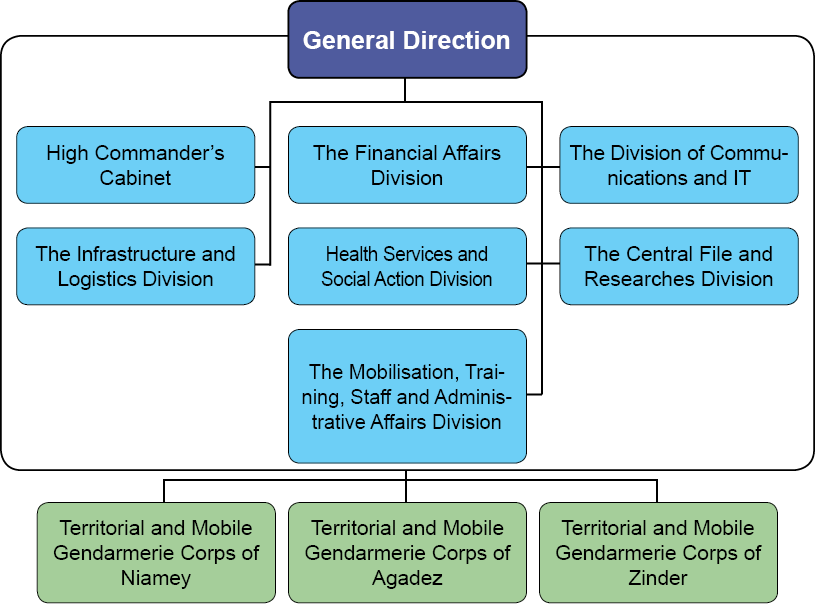
Central Organization
The general staff includes:
• the High Commander’s Cabinet (HCC);
• the Financial Affairs Division (FAD);
• the Transmission and Computer related service Division (TCD);
• the Infrastructure and Logistics Division (ILD);
• health Services and Social Action Division (HS/SAD);
• the Mobilisation, Training, Staff and Administrative Affairs Division (MTSAAD);
• the Central File and Researches Division (CFRD).
Territorial organization
• 3 Territorial Gendarmerie/Mobile Gendarmerie (TG/MG) Corps (Niamey, Agadez, Zinder). It is about territorial and not departmental gendarmerie.
• 3 Researches/Criminal investigations Brigades (1 by TG/MG corps).
• 8 Squad of Territorial Gendarmes ("Groupement" in France) (GT).
• 17 companies.
• 78 brigades among which 10 mixed and 1 traffic police brigade.
• 10 platoons of mobile gendarmes + The "Red Guard" (For Presidency honours, that is subordinated to the Niamey 1st Platoon of gendarmes).
Specialized Training
• The National Gendarmerie Intervention Special Unit (NGISU).
• The mobile Horse Platoon (cavalry).
• The Air Transport Gendarmerie Company.
• The road traffic Platoon.
• 3 River brigades (Niamey, Tillabéry, Gaya).
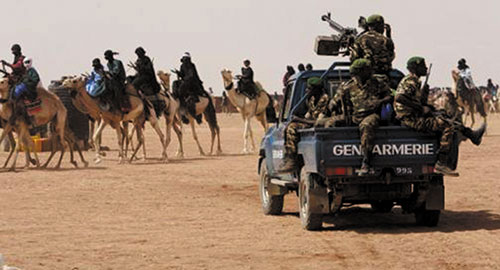
Missions
Missions The Criminal Investigation Department. As in France, the PJ consists in noticing breaches of the penal law (crimes, offences and fines), in gathering the evidences, in looking for and in arresting the authors, in executing the judicial delegations (judicial requisitions, letters rogatory, notifications). These missions are performed under the direction, the control and the surveillance of the magistrates of the judicial order. We also find:
• the National Police and Gendarmerie common laboratory, the Crime Laboratory (CL) ;
• the Researches and Central File Division is working with index cards (but it is effective) ;
• the fingerprints Automated-recorded-system File.
The administrative police is all the rules imposed by the public authority (in Niger it is the governor over the prefect, over the mayor) relating to the maintenance of law and order, the security and the public tranquillity, and the extrajudicial measures in order to insure the execution. It aims at preventing commission of penal law breaches. It consists in the general surveillance, the prevention of breaches, the execution of laws and regulations, the traffic police, the military police, the maintenance and the restoring of public law and order, the public/administrative investigations. The Niamey Road Traffic Platoon (RTP) essentially performs authorities’escorts with motorcycle and any report in accident involving armed forces.
The mixed brigades and the traffic police brigade of Zinder perform traffic police mission and record accidents. Their vehicles are "pick-up" and some motorcycles (no tachometer, alcohol level control, overloads infringement, etc.).
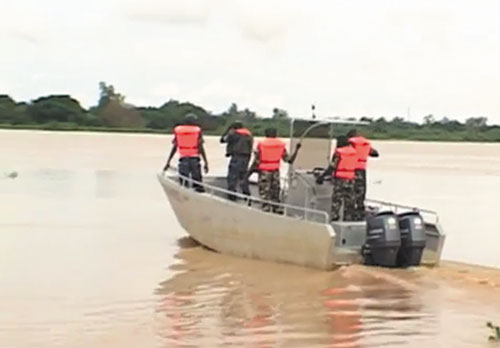
The missions of defence:
• in peacetime : Collecting intelligence mission, Patrols, Sensitive points protection, escorts of military convoys;
• in times of crisis: Collecting operational intelligence, fighting mission beside the other armed forces, the Territory Operational Defence (TOD), the escorts of military convoys, Provost brigades, the External Operations (Haiti, Mali, Ivory Coast, Centres Africa, Congo at the level of approximately 280 staffs in mission).
Staff
The Niger National Gendarmerie includes 6095 servicemen whose status is governed by the prescription n° 2010-75 of December 09th, 2010 giving status of the Armed forces Military Staff. The National Gendarmerie employs besides approximately 30 civilians (state employees and "state workers") within the automobile and barracks Service detail from the Ministry of Defence to the National Gendarmerie. Their management doesn’t fall under Gendarmerie responsibility.
The feminine recruitment is opened since January 1st, 1989. There are no conscripts of the contingent. The Gendarmerie staffs are accommodated under the imperative necessity of service position; but housing being insufficient thus some are accommodated in the civil environment, the single living in dedicated buildings. The marriage is subjected to a prior authorization after 5 years of service for the male staff and 3 years of service for the feminine staff.
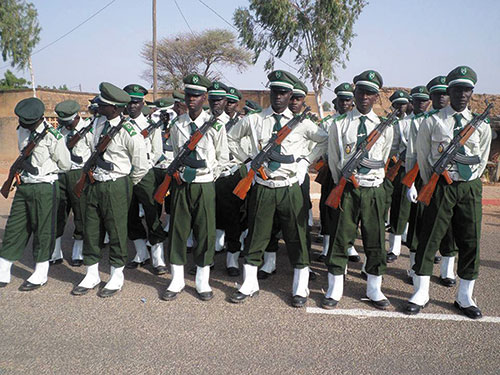
Modes of recruitment:
• Officers:
- direct recruitment by competitive examination (Bachelor’s degree level),
- semi-direct recruitment by competitive examination among the non-commissioned officers holders of the high school diploma and with at least 5 years of service,
- internal recruitment by competitive examination among chief warrant officers holders of the 2nd level Certificate of technical achievement or equivalent under conditions of age,
- collateral recruitment by competitive examination among University/Higher education school graduated candidates with specific skills the Gendarmerie is looking for,
- recruitment by competitive examination among the Niger Armed Forces (NAF) captains and lieutenants;
• Non-commissioned officers:
- direct recruitment by competitive examination holders of the high school diploma or equivalent, or ‘on title’among the former children’s troop/reared by the army,
- semi-direct recruitment among the gendarmes holders of the General Certificate Secondary Education (GCSE) being more than 5 years old service position and having satisfied an examination,
- internal recruitment among the gendarme’s holders of a 2nd level Certificate of Professional Proficiency or an equivalent diploma,
- collateral recruitment by competitive examination among the graduates (High school diploma + 2 years study) with skills the Gendarmerie is looking for,
- the recruitment can also be made by competitive examination among the NAF non-commissioned officers.
• Enlisted Man/Deputy gendarme:
- the gendarme is recruited by competitive examination when they are holder of the General Certificate Secondary Education (GCSE) at least. These staffs is submitted to a military training course (1 year long).
Training institutions
The school of the National Gendarmerie is located in Koira Tégui (in the North part of Niamey).
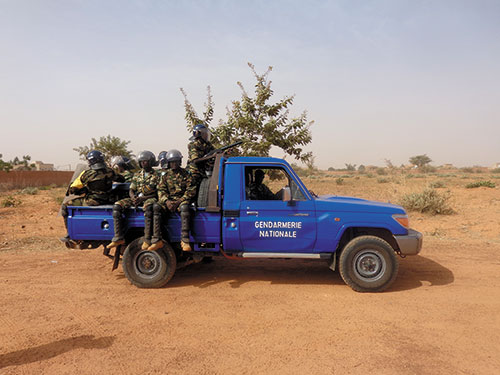
Main equipment
• Armament: AK 47, RPG 7, Dragonov, Tokarev NP18, Makarov, 12.7, 14.5) COUGAR.
• Vehicles: motorcycles BMW 2000RT, pick-up Toyota, trucks, bus.
• Nautical means: Speedboats with Yam Enduro 115, dugouts canoe/pirogue.
Cooperation
From 2000 to 2013, an important cooperation was led aiming at providing an assistance, both for the units equipment as for the financing of several Gendarmerie School infrastructures realization, intended for the Forces training.
Then, the cooperation aims at bringing a support for the officers’ training, assistance within the formations revision framework (Gendarmerie School, OPJ, etc.). Finally, France helps in the elaboration of an action plan by direction, bringing at the same time its expertise in the field of the referents specialization (transport, school, in particular).
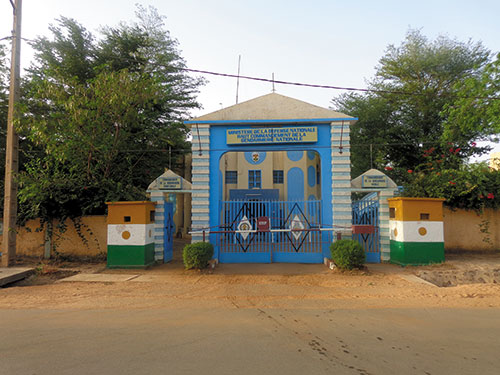
© The iconography was provided by the concerned police stations

